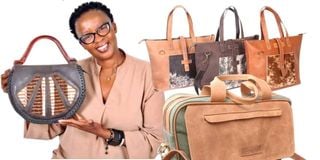Premium
Paulina Mokhothu: Creating fashion with cultural significance

Paulina Mokhothu is the founder of Tlkhomelo. The company refines leather fashion by intricately weaving narratives of African heritage into each crafted piece.
Paulina Mokhothu Ogola's journey into leather crafting goes beyond aesthetics; it is deeply intertwined with her personal history and cultural heritage. Her story begins in her grandfather's home in Lesotho, where the warmth of a leather rug provided a backdrop for cherished early memories.
Her passion for leather craft was ignited by watching her uncle, a master craftsman, skilfully cut, sew and assemble various leather items. This formative exposure instilled in her a deep appreciation for the craftsmanship involved in creating pieces that would last for generations.
“This early influence not only sparked my fascination with leather but also guided me toward a future where I could contribute to this age-old craft,” she reflects.
“In 2006, I left Lesotho following the love of my life, but shortly after, my partner returned to work in Somaliland, leaving me in Nairobi. Struggling to find work as a social worker, I had to navigate life in Kenya on my own. By the time he left, I had discovered local markets where I could source creative products,” she says, adding that she began buying items and shipping them back to Lesotho.
On a visit home, she took Maasai baskets to sell. When one of the baskets lost its beads, she decided to rebead it, even though she had no previous experience. To her surprise, the redesign surpassed the original, sparking her venture into buying, decorating, and selling Maasai baskets.
“I later pursued formal education in leather product design and development at the Kenya Industrial Research and Development Institute, refining my skills through short courses at ILFS, an Indian institute, and the Mitreeki Fashion Mentorship Program, alongside resources available on YouTube,” she notes.
Through her brand, Tlhokomelo, Ms Mokhothu navigates the complexities of the leather industry with a dual purpose: to achieve profitability while championing economic empowerment, sustainability, and the vibrant stories that enrich Africa's cultural tapestry.
For her, the leather carpet represents more than just a floor covering; it embodies the durability and authenticity she strives to incorporate into her creations.
She studied for her degree in Social Work at the National University of Lesotho and then an MSc in Entrepreneurship from the Jomo Kenya University of Agriculture and Technology (JKUAT). The intersection of these fields would ultimately inform her approach to leather production.
“During my master’s thesis, I explored a World Bank report highlighting the potential of the Kenyan leather industry. The staggering statistic that 90 percent of the country’s leather is exported in a semi-processed state ignited a sense of urgency within me,” she says, adding that this gap represented a significant opportunity—not only for personal growth but also for economic empowerment and job creation in Kenya.
Life often takes unexpected turns, and hers was no different. As she sought a position as a social worker, she faced challenges securing employment in a saturated job market.
It was during this time of uncertainty that her research into the leather industry began to coalesce into a concrete vision. She decided to launch her leather bag brand, motivated by the dual desire to create a successful business and to contribute positively to her community.
In 2012, Ms Mokhothu officially registered her company, Tlhokomelo.
“Many products available at the time lacked storytelling and heritage, elements I believed were essential to capturing the essence of African culture. The vision behind my leather bag company extends beyond mere profitability. I aimed to create wealth while showcasing the rich heritage of Africa,” she says.
She points to the meticulous process of creating leather bags, starting with an idea that emphasises both functionality and aesthetics. In the design phase, she focuses on the shape, compartments, closures and lining of the bags, envisioning how each piece will serve its user while embodying cultural significance.
Tlhokomelo's flagship items include a diverse portfolio of leather bags—tote bags, structured women’s bags, laptop bags, backpacks, duffel bags, and various accessories.
Every year, she says, a new collection is introduced, such as the Neo Collection, named in honour of her brother. This line features structured handbags designed for various occasions, emphasising functionality without sacrificing style.
Ms Mokhothu notes that innovation plays a critical role in product development. “One of our latest endeavours, the Embodied Collection, blends leather with traditional Kiondo weaving techniques, showcasing the cultures of both Lesotho and Kenya.”
As well as showcasing artisanal skills, the collection is part of the Real Leather Stay Different 2024 Africa Competition, reflecting the firm's commitment to innovation and cultural representation.
Looking to the future, the company's vision includes expanding its product range and entering new markets. She emphasises their focus on reaching customers across Africa and the Diaspora who value ethically made, sustainably sourced products.
The Tlhokomelo production facility is located in Utawala, Nairobi. Ms Mokhothu emphasises that working with local suppliers not only supports the economy, but also fosters a sense of community, allowing them to preserve traditional craftsmanship while innovating for the future.
"We currently operate with a dedicated team that consists of three artisans, one designer, and four support staff. We also engage two consultants and three temporary staff as needed, allowing us to adapt to demand," she explains.
The team currently produces between 30 and 80 bags and other items per month, depending on orders, with retail prices starting at Sh5,000.





